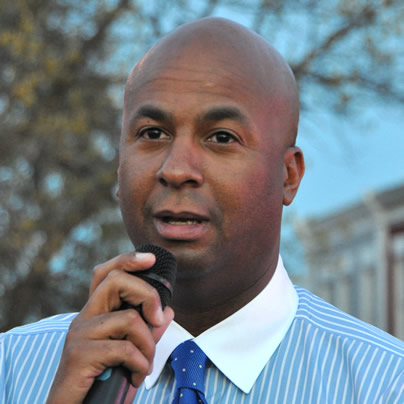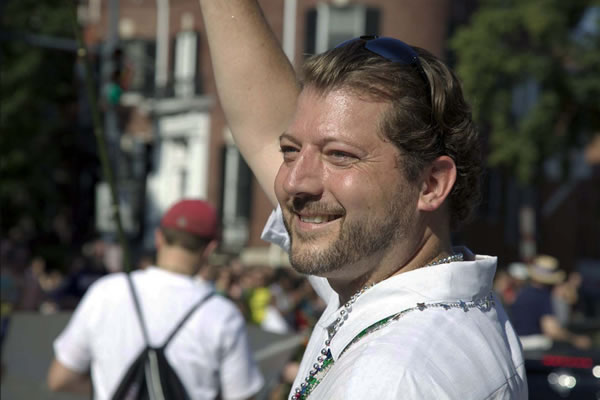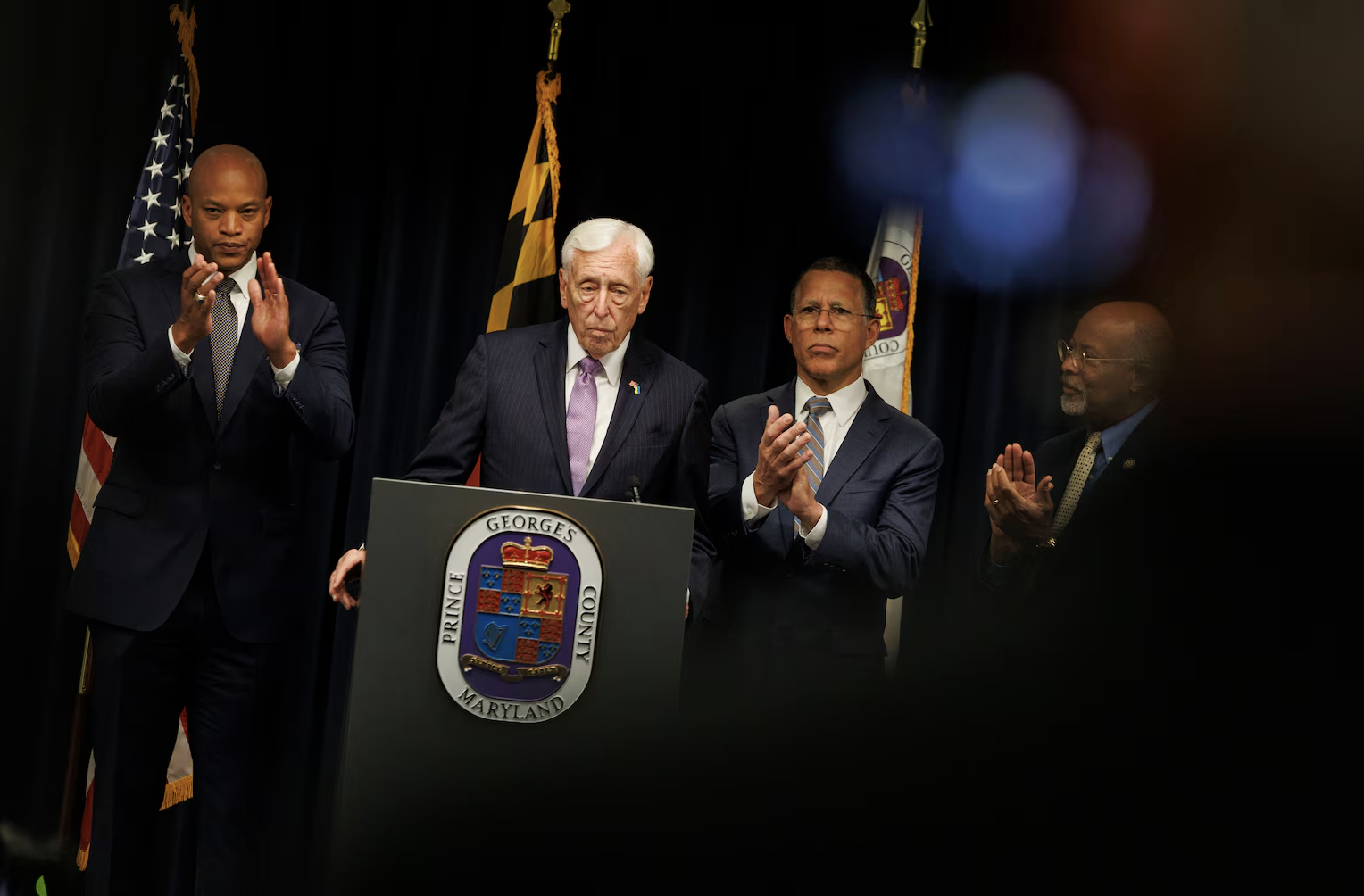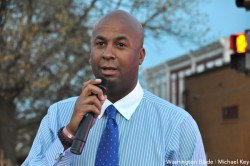Local
Grosso beats Brown in ‘gay’ precincts
Both candidates strong supporters of LGBT rights


David Grosso accomplished a rare feat in D.C. politics by unseating an incumbent last week. (Photo courtesy of Grosso for Council 2012)
Independent D.C. Council candidate David Grosso beat incumbent Council member Michael Brown (I-At-Large) on Nov. 6 in 15 out of 16 voter precincts with large numbers of LGBT residents.
According to final but unofficial returns from the D.C. Board of Elections, Grosso finished ahead of Brown in the so-called “gay” precincts by a significantly greater margin than Grosso bested Brown in the citywide vote.
Grosso surprised many political observers by accomplishing a rare feat in D.C. politics — unseating an incumbent Council member.
In the citywide vote, Grosso came in second place in a seven-candidate race with two at-large seats in play. Under the city’s election law, a Democratic candidate is eligible for only one of the seats.
Incumbent Democrat Vincent Orange won re-election by finishing first with 37.4 percent of the vote. Grosso finished second, with 20.8 percent, making him the winner of the second of the two seats. Brown came in third place, with 15.3 percent of the vote.
However, in 11 of the 16 precincts with high concentrations of LGBT voters Grosso came in first place. He finished second in another four of the “gay” precincts.
Brown came in second place in just one of the precincts with high concentrations of LGBT residents – Precinct 112, which is located in Anacostia.
Brown finished in sixth place in six of the precincts and finished third or lower in the remaining four.
In the citywide tally, Republican Mary Brooks Beatty finished fourth with 7 percent of the vote, independent candidates A.J. Cooper and Leon Swain tied for fifth place with each getting 6.6 percent, and Statehood Green Party candidate Ann Wilcox came in last place with 5.8 percent.
Although political insiders acknowledged that Brown was hurt by the latest in a series of personal financial problems, most pundits expected the otherwise popular Council member to survive his re-election bid.
Brown has been a longtime strong supporter of LGBT rights, voting for virtually every LGBT supportive bill or amendment, including the city’s same-sex marriage bill that has come before the Council during his close to four-year tenure as a Council member.
Grosso has worked for pro-gay former Council member Sharon Ambrose (D-Ward 6) and for pro-gay Del. Eleanor Holmes Norton (D-D.C.). He has expressed support for LGBT issues during the campaign. He and Brown also campaigned aggressively in the LGBT community.
Nearly all of the precincts with a high concentration of visible LGBT residents are in majority white sections of the city. Most of the majority white areas voted for Grosso and most of the majority black sections of the city voted for Brown and Orange over Grosso.
D.C. political consultant Chuck Theis, who has been a longtime observer of D.C. elections, said the parts of the city where Grosso finished ahead of Brown, including the gay precincts, are made up largely of liberal-progressive whites who voted overwhelmingly for President Obama’s re-election. Theis said these voters, who supported Brown four years ago, appear to have lost confidence in him due to the widely publicized reports of Brown’s financial problems, including Brown’s disclosure earlier this year that more than $100,000 in campaign funds were stolen by his campaign treasurer. The treasurer denied stealing the funds.
Most of the majority black sections of the city, especially in Wards 7 and 8, appear to have had less of a problem with Brown’s financial issues and view him as a strong supporter of the issues they deem important, such as affordable housing and efforts to curtail the high unemployment rate in the two wards.
“Michael Brown stepped into a perfect storm,” Theis told the Blade. “He had almost no money due to his missing campaign funds, and the missing funds became a scandal. This raised the issue of all his past financial problems.”
The unexpectedly strong campaign waged by Grosso, who attacked Brown on his financial problems, and the unusual at-large election system, in which voters are asked to select two candidates but close to half the voters select just one (the Democrat) – appear to have created an insurmountable problem for Brown, Theis said.
Following is a list of the 16 precincts with large concentrations of LGBT residents and the vote count, by percentage, as reported by the D.C. Board of Elections:
- Precinct 14 (Dupont Circle): Grosso, 30.2; Orange, 23.5; Brown, 5.6
- Precinct 15 (Dupont Circle): Grosso, 30.5; Orange, 21.9; Brown, 6.3
- Precinct 16 (Logan Circle): Grosso, 30.8; Orange, 25.0; Brown, 8.9
- Precinct 17 (Logan Circle): Orange, 28.8; Grosso, 26.5; Brown, 11.1
- Precinct 141 (Logan Circle): Grosso, 29.4; Orange 24.3; Brown, 8.6
- Precinct 22 (14th and U Street, N.W. area): Grosso, 29.4; Orange, 24.9; Brown, 10.2
- Precinct 23 (Columbia Heights): Orange, 35.1; Grosso, 21.3; Brown, 13.1
- Precinct 24 (Adams Morgan): Grosso, 30.1; Orange, 26.5; Brown, 9.9
- Precinct 25 (Adams Morgan): Grosso, 33.1; Orange, 19.8; Brown, 8.8
- Precinct 39 (Mt. Pleasant): Grosso, 30.8; Orange, 26.2; Brown, 11.3
- Precinct 40 (Mt. Pleasant): Grosso, 33.4; Orange, 22.3; Brown, 9.1
- Precinct 89 (Capitol Hill): Grosso, 41.3; Mary Brooks Beatty, 16.2; Orange, 13.7; Brown, 5.5
- Precinct 90 (Capitol Hill): Grosso, 36.2; Orange 18.2; Brown, 5.0
- Precinct 112 (Anacostia): Orange, 58.2; Brown, 23.8; Grosso, 4.8
- Precinct 127 (Southwest Waterfront): Orange, 37.8; Grosso, 18.7; Brown, 16.4
Virginia
Gay Va. State Sen. Ebbin resigns for role in Spanberger administration
Veteran lawmaker will step down in February

Alexandria Democrat Adam Ebbin, who has served as an openly gay member of the Virginia Legislature since 2004, announced on Jan. 7 that he is resigning from his seat in the State Senate to take a job in the administration of Gov.-Elect Abigail Spanberger.
Since 2012, Ebbin has been a member of the Virginia Senate for the 39th District representing parts of Alexandria, Arlington, and Fairfax counties. He served in the Virginia House of Delegates representing Alexandria from 2004 to 2012, becoming the state’s first out gay lawmaker.
His announcement says he submitted his resignation from his Senate position effective Feb. 18 to join the Spanberger administration as a senior adviser at the Virginia Cannabis Control Authority.
“I’m grateful to have the benefit of Senator Ebbin’s policy expertise continuing to serve the people of Virginia, and I look forward to working with him to prioritize public safety and public health,” Spanberger said in Ebbin’s announcement statement.
She was referring to the lead role Ebbin has played in the Virginia Legislature’s approval in 2020 of legislation decriminalizing marijuana and the subsequent approval in 2021of a bill legalizing recreational use and possession of marijuana for adults 21 years of age and older. But the Virginia Legislature has yet to pass legislation facilitating the retail sale of marijuana for recreational use and limits sales to purchases at licensed medical marijuana dispensaries.
“I share Governor-elect Spanberger’s goal that adults 21 and over who choose to use cannabis, and those who use it for medical treatment, have access to a well-tested, accurately labeled product, free from contamination,” Ebbin said in his statement. “2026 is the year we will move cannabis sales off the street corner and behind the age-verified counter,” he said.
Maryland
Steny Hoyer, the longest-serving House Democrat, to retire from Congress
Md. congressman served for years in party leadership

By ASSOCIATED PRESS and LISA MASCARO | Rep. Steny Hoyer of Maryland, the longest-serving Democrat in Congress and once a rival to become House speaker, will announce Thursday he is set to retire at the end of his term.
Hoyer, who served for years in party leadership and helped steer Democrats through some of their most significant legislative victories, is set to deliver a House floor speech about his decision, according to a person familiar with the situation and granted anonymity to discuss it.
“Tune in,” Hoyer said on social media. He confirmed his retirement plans in an interview with the Washington Post.
The rest of this article can be found on the Baltimore Banner’s website.
District of Columbia
Kennedy Center renaming triggers backlash
Artists who cancel shows threatened; calls for funding boycott grow

Efforts to rename the Kennedy Center to add President Trump’s name to the D.C. arts institution continue to spark backlash.
A new petition from Qommittee , a national network of drag artists and allies led by survivors of hate crimes, calls on Kennedy Center donors to suspend funding to the center until “artistic independence is restored, and to redirect support to banned or censored artists.”
“While Trump won’t back down, the donors who contribute nearly $100 million annually to the Kennedy Center can afford to take a stand,” the petition reads. “Money talks. When donors fund censorship, they don’t just harm one institution – they tell marginalized communities their stories don’t deserve to be told.”
The petition can be found here.
Meanwhile, a decision by several prominent musicians and jazz performers to cancel their shows at the recently renamed Trump-Kennedy Center in D.C. planned for Christmas Eve and New Year’s Eve has drawn the ire of the Center’s president, Richard Grenell.
Grenell, a gay supporter of President Donald Trump who served as U.S. ambassador to Germany during Trump’s first term as president, was named Kennedy Center president last year by its board of directors that had been appointed by Trump.
Last month the board voted to change the official name of the center from the John F. Kennedy Memorial Center For The Performing Arts to the Donald J. Trump And The John F. Kennedy Memorial Center For The Performing Arts. The revised name has been installed on the outside wall of the center’s building but is not official because any name change would require congressional action.
According to a report by the New York Times, Grenell informed jazz musician Chuck Redd, who cancelled a 2025 Christmas Eve concert that he has hosted at the Kennedy Center for nearly 20 years in response to the name change, that Grenell planned to arrange for the center to file a lawsuit against him for the cancellation.
“Your decision to withdraw at the last moment — explicitly in response to the Center’s recent renaming, which honors President Trump’s extraordinary efforts to save this national treasure — is classic intolerance and very costly to a non-profit arts institution,” the Times quoted Grenell as saying in a letter to Redd.
“This is your official notice that we will seek $1 million in damages from you for this political stunt,” the Times quoted Grenell’s letter as saying.
A spokesperson for the Trump-Kennedy Center did not immediately respond to an inquiry from the Washington Blade asking if the center still planned to file that lawsuit and whether it planned to file suits against some of the other musicians who recently cancelled their performances following the name change.
In a follow-up story published on Dec. 29, the New York Times reported that a prominent jazz ensemble and a New York dance company had canceled performances scheduled to take place on New Year’s Eve at the Kennedy Center.
The Times reported the jazz ensemble called The Cookers did not give a reason for the cancellation in a statement it released, but its drummer, Billy Hart, told the Times the center’s name change “evidently” played a role in the decision to cancel the performance.
Grenell released a statement on Dec. 29 calling these and other performers who cancelled their shows “far left political activists” who he said had been booked by the Kennedy Center’s previous leadership.
“Boycotting the arts to show you support the arts is a form of derangement syndrome,” the Times quoted him as saying in his statement.
-

 District of Columbia5 days ago
District of Columbia5 days agoImperial Court of Washington drag group has ‘dissolved’
-

 Colombia4 days ago
Colombia4 days agoGay Venezuelan man who fled to Colombia uncertain about homeland’s future
-

 District of Columbia4 days ago
District of Columbia4 days agoKennedy Center renaming triggers backlash
-

 Arts & Entertainment4 days ago
Arts & Entertainment4 days ago2026 Most Eligible LGBTQ Singles nominations




















